Not long ago, it was believed that our brains were incapable of change throughout our entire lifespan. It was thought that our brain’s structure and development were mostly permanent following infancy and childhood. Decades of research have revolutionized our comprehension of the human brain, allowing for better recovery outcomes for patients with neurological injuries.
Our central nervous system (CNS) is comprised of our brain and spinal cord. After injuries to our CNS, such as Traumatic Brain Injury (TBI) and Spinal Cord Injury (SCI), we now incorporate principles of neuroplasticity as a key to recovery.
Neuroplasticity is the ability of our brain and spinal cord to continuously rewire new neuron pathways to enhance motor learning following an injury. This means that the brain has the capacity to form new neural circuits in response to ongoing activity. These connections are constantly becoming stronger or weaker in response to stimulation, learning, and experience.
Neuroplasticity came from the word neuro or neurons and plasticity, which refers to the brain’s malleability. So basically, neuroplasticity means the neuron’s ability to adjust, change, or become easily influenced or trained.
Furthermore, our brain’s flexibility for change allows new networks to enhance our movement and regain functional independence.
“Neuroplasticity is also the mechanism by which damaged brain relearns lost behavior in response to rehabilitation” – Kleim & Jones, 2008. We now understand our brain's ability to adapt, and change can occur at any stage of life.
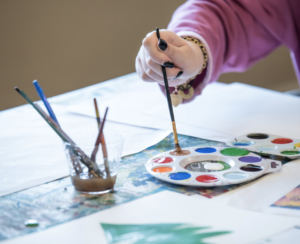
Neurological disorders refer to conditions that affect the nervous system. Such diseases not only cause cognitive damage but also functional impairment, such as difficulties in moving, speaking, swallowing, and eye-hand coordination.
Fortunately, doctors and physical therapists can help treat these symptoms by boosting neuroplasticity. Once stimulated, it can help restore lost neuronal connections, establish proper brain signaling, and eliminate weak or damaged neural cells.
The right kind of treatment and rehabilitation programs can help promote neuroplasticity, thus resulting in the following benefits over time:
However, the effectiveness of neuroplasticity can vary from person to person and may still depend on several factors. For example, a younger brain is much more moldable; thus, it can quickly adapt to new changes and show promising results in a short span of time than an older patient. Other variables that can influence neuroplasticity include:
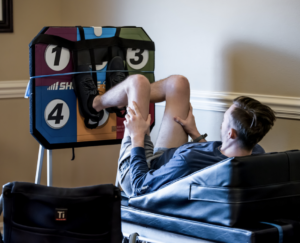
Our model of care is based on a patient-centered focus. Intensive, focused rehabilitation helps restore function and maximize feedback/feedforward mechanisms to promote long-term memory. After all, research shows the earlier the care, the better the outcome.
Neuroplasticity is best targeted by intense repetitious training that challenges the body appropriately. Our skilled therapists focus not only on repetition but properly dosing activities to the skill level of our clients. Some of the therapeutic services we provide that can help promote neural plasticity include:
Patients will cycle through these therapy sessions every week to strengthen their physical and mental wellness. In between programs, it's also important to prioritize rest as it’s a crucial part of improving the brain’s neural plasticity.
Research suggests that sleep helps in structural neural plasticity by encouraging dendritic growth. So our therapists make it a point to pace rehab programs and include sleep and rest in the patients’ schedule.
Our rehabilitation services help drive CNS reorganization through task-specific interventions. Movement is medicine because continuous practice enhances our brain's ability to relearn patterns and form new pathways to return to independence.
If you or someone you know can significantly benefit from our neuro rehabilitation services, don’t hesitate to get in touch with our team!
At NeuLife Rehab, we help keep your body and brain moving by providing high-quality physical therapy programs to patients with neurological conditions. We will work on reducing your pain, improving your strength, and getting you back to doing what you love.
Besides neuro rehab services, our board-certified physical therapists also specialize in providing the following rehabilitative services:
Contact us now at 800-626-3876, so we can start creating your plan of care! You can also make a referral by filling up an online form or learn more about our services at our website.
The material contained on this site is for informational purposes only and DOES NOT CONSTITUTE THE PROVIDING OF MEDICAL ADVICE, and is not intended to be a substitute for independent professional medical judgment, advice, diagnosis, or treatment. Always seek the advice of your physician or other qualified healthcare providers with any questions or concerns you may have regarding your health.
Brain Injury Rehab Florida – The Brain Injury Association of America estimates that more than 3.6 million Americans (children and adults) have sustained a TBI (traumatic brain injury). Moreover, nearly 795,000 people have suffered an acquired brain injury (ABI) from non-traumatic causes. The data is terrifying, especially taking into account all the effects brain injuries have on the injured and their families.
Some of the physical and cognitive impacts of TBI may be permanent, but that doesn’t mean that we cannot do anything more to help TBI patients. There are actually a LOT of things that we can do to help bring back quality and a sense of normalcy to the patients' and families’ lives. One great example is by supporting the National Brain Injury Awareness Month.
For more than three decades, the Brain Injury Association of America (BIAA) has proudly led the nation in observing National Brain Injury Awareness Month by conducting an engaging public awareness campaign in March of each year. The theme for this year’s campaign is #MoreThanMyBrainInjury.
The #MoreThanMyBrainInjury public awareness campaign provides a platform for educating the general public about the incidence of brain injury and the needs of people with brain injuries and their families. Individuals who join us to help raise awareness with the #MoreThanMyBrainInjury campaign are essential to:
To honor this year’s Brain Injury Month, here are some simple ways how you can participate and help spread awareness.
Change starts within yourself. So, if you want people to change their perspective on TBI, then you should work on developing your perception first. One way to do that is by learning about traumatic brain injuries and their effect on their victims.
In our past article, we discussed everything there is to know about traumatic brain injuries一what it is, its types, causes, and available treatment options. We also covered the impact and consequences of TBI on an individual’s life, such as:
Understanding TBI on a whole new level can help you protect yourself and your loved ones by recognizing early signs and symptoms. It also allows you to develop empathy for patients and families affected by the condition.
Everyone needs to know about TBI and how common it is. It is not only to raise awareness for traumatic brain injury but also to bring attention to the patients who struggle with the consequences of the trauma every single day. Their struggles range from limited abilities to reduced mobility to diminished cognitive skills.
Discussing it with your parents, children, and relatives can encourage them to be an advocate and an ally for healing. It also breaks the stigma surrounding traumatic brain injury, thus helping improve the lives of patients diagnosed with it.
Some topics that you can focus on include emergency responses to concussion, causes of TBI, and how to prevent it.
Social media can be a powerful tool in raising awareness. With one click, you can easily share informative publication materials about TBI, distribute downloadable resources or share a friend’s TBI healing journey.
You can also join forums and start a healthy conversation about this condition and why patients need their help. If you have the time and resources, you can even invite a speaker and host a free webinar to impart credible information regarding brain injuries.
If you have the financial capacity for it, another way to show solidarity is by donating to a local organization or group that supports traumatic brain injury patients.
Every cent can help fund the recovery and rehabilitation of TBI patients who lack the financial means to afford their medical treatment. Non-profit research groups can also use your donation to support their medical research regarding traumatic brain injuries.
Of course, these charities and organizations also accept in-kind donations, such as clothes, food, medicines, and other items that can help patients and families.
One search on the internet can easily lead you to national events or local fundraisers that support the cause of TBI patients. For example, you can participate in marathons for a cause, purchase goods in their bake sale, or buy for sale items in garage sales.
If you want to take your commitment to the next level, then you can show support by volunteering in TBI-related events and activities. Sign up to be a part of an organizing committee or start your own event with the help of friends and family.
You can also volunteer your professional services to your trusted, non-profit organizations for TBI patients. For example, if you are a health worker (e.g., doctor, therapist), then you can volunteer on medical missions or rehabilitation programs to serve those who cannot afford medical treatments.
If your expertise lies in the creative department, you can volunteer your artistic services to an organization by providing free digital graphics or writing an informational blog about TBI. These efforts can help non-profit groups efficiently raise awareness, which benefits individuals and families affected by brain injuries.
For traumatic brain injury patients, nothing is more encouraging than an inspiring story about recovery. So if you or a loved one has any experience in dealing with TBI, then you can tell your story. Sharing one’s own experiences, struggles, and coping techniques can help a lot of patients and families. Some examples of the things you can share include:
For someone diagnosed with a TBI, knowing that they’re not alone in this makes such a huge difference in their outlook in life. Moreover, it can bring a lot of hope and positive influence on their commitment towards recovery and healing.
So, we encourage you to go to the Brain Injury Association of America’s Campaign Page ‘#MoreThanMyBrainInjury’ and get involved!
In our facility, we do our best to make the healing process go as smoothly as possible by making our patients’ needs a priority.
The brain injury rehabilitation program at NeuLife offers a full continuum of services for patients who have experienced a traumatic brain injury (TBI), non-traumatic/mild brain injury (MBI), or acquired brain injury (ABI) including stroke. The comprehensive program at our brain injury facility encompasses the unique needs of each patient and family. The team focuses on maximizing abilities, providing education, increasing mobility, and preventing complications.
So if you're looking for a neuro rehab near me, then don’t hesitate to get in touch with our expert therapists and medical professionals.
NeuLife Rehabilitation is dedicated to providing the highest quality of care. As a CARF Accredited Residential Rehabilitation Program and Brain Injury Specialty Program, NeuLife is continuously evaluated and measured for success.
We strive to consistently provide the highest standard of care in delivering quality clinical rehabilitative services to patients with catastrophic injuries and other challenging diagnoses to produce superior outcomes and exceed the expectations of all persons served.
Our brain injury rehabilitation program includes clinical evaluations, medical care, and therapeutic activities that are customized to meet the goals, needs, and abilities of each patient.
By leveraging various rehabilitation services, we can create an integrated approach focused on helping each patient recover skills associated with activities of daily living (ADLs) using compensatory strategies and mobility aids to achieve a seamless transition into the community. Every component of the treatment plan is customized to the individual patient for guaranteed results.
We also offer post acute rehabilitation and catastrophic rehabilitation for other types of injuries. If you would like more information about NeuLife Rehabilitation Services, please contact us at 800-626-3876.
The material contained on this site is for informational purposes only and DOES NOT CONSTITUTE THE PROVIDING OF MEDICAL ADVICE, and is not intended to be a substitute for independent professional medical judgment, advice, diagnosis, or treatment. Always seek the advice of your physician or other qualified healthcare providers with any questions or concerns you may have regarding your health.
Traumatic Brain Injuries (TBI) have severe short-term effects on daily life and can affect a person long-term, even years after the injury. Physical and emotional symptoms can be long-lasting, causing stress and frustration not just for the patient but also for family members.
Some patients even report symptoms over 20 years after the injury. The leading cause of traumatic brain injuries are accidents (often car accidents) and falls by senior citizens, which pose unique challenges for rehabilitation.
This article will focus on long-term brain injury symptoms and options for managing their symptoms with post-acute rehab.
After a TBI, the brain works to repair the damage. Sometimes the process happens relatively quickly, especially with rehabilitation. About a third of patients recover within the first six months of the injury, and the patient often returns to their pre-injury condition.
But, in other patients, parts of the brain cannot be repaired or may even decline. In these cases, it may result in long-term or even lifetime damage. These symptoms can also have a delay in onset. Often accompanying these symptoms are social and emotional symptoms that add to difficulties in recovery.
Some patients face chronic complications. Symptoms vary depending on the individual's injury. Some symptoms include:
Some patients find headaches and migraines worsen over time.
About a quarter of patients still experience sensitivity to light and noise (photophobia) one year after their injury.
Dizziness is one of the most common long-term symptoms after injury. At least one-fifth of patients experience the symptom five years after the injury.
Many patients with a TBI experience visual difficulties and still experience the symptom three years or more after their injury.
Though more research needs to be completed, there seems to be a connection between severe TBIs, dementia, and Alzheimer's disease. Most researchers agree there is an increased risk of TBIs developing into these diseases.
The patient may require long-term rehabilitation at a neuro rehabilitation center. Rehabilitation therapists can continue to work with the patient to manage their symptoms. Sometimes the patient requires months at a neuro rehab center before transitioning home with ongoing outpatient services.
Rehabilitation centers will continue to work with patients on basic skills such as walking or talking, getting dressed, and other activities of daily life. A team approach is often used to help the patient recover and get as close to everyday living as possible. The team includes:
Neulife Rehab is one of Florida's most extensive brain injury facilities and the southwest United States. Through rehabilitation, medical management, psychiatric, neurophysical services, occupational, speech, and cognitive therapies, and much more, we provide the best in care, so your loved one has the BEST POSSIBLE recovery.
Schedule a tour to see our facility to decide if it may be appropriate for your loved one. Please reach out to us at 1-888-626-3876. We are always here to answer questions.
The material contained on this site is for informational purposes only and DOES NOT CONSTITUTE THE PROVIDING OF MEDICAL ADVICE, and is not intended to be a substitute for independent professional medical judgment, advice, diagnosis, or treatment. Always seek the advice of your physician or other qualified healthcare providers with any questions or concerns you may have regarding your health.
Dealing with the results of traumatic brain injury is very challenging. It is important to choose the right partner to accompany you on the journey. What makes a good brain injury rehabilitation program?
Many factors need to be considered before choosing a brain injury clinic if you are looking for a brain injury rehab in Florida for you or your loved one. Where is the facility located? How is it equipped? What are some of the programs offered in the clinic? Is the staff experienced with the type of situation you’re in?
At NeuLife Rehab, we do our best to make patients as comfortable as possible because we firmly believe that the right frame of mind can significantly affect their treatment.
We take care of everything to make sure that the patient can focus exclusively on getting better.
If you are looking for a brain injury clinic in Florida, here is some helpful information about our center to make the decision easier for you:
NeuLife is a post-acute inpatient brain injury rehab center in Florida designed to provide brain injury rehab programs. The facility itself is one of the largest brain injury centers in the Southeast, with 54 private patient suites, fully equipped therapy rooms, a skills-retraining laundry room, accessible theater, and many other amenities spread across the 43-acre property.
Furthermore, our multi-specialty team means that all aspects of a patient’s brain injury rehab are addressed. These specialties include physiatry, psychiatry, neuropsychology, cognitive therapy, speech-language pathology, dietetics, physical therapy, and more.
Brain injury rehabilitation at NeuLife is guided by an interdisciplinary team of clinical professionals and focuses on each patient's individual needs and abilities. Each individualized care plan addresses all facets of brain injury recovery. Our multidisciplinary team works together to provide integrated care designed for optimal independence and a safe return home.
The multi-specialty team at our brain injury center includes:
Physicians & Medical Specialists, Physical Therapists, Cognitive Therapists, Occupational Therapists, Speech-Language Pathologists, Recreational Specialists, Dietitians, Community Reintegration Specialists, Case Managers, Certified Rehabilitation Registered Nurses, Neuropsychologists
The brain injury rehabilitation program at NeuLife offers a full continuum of services for patients who have experienced a traumatic brain injury (TBI), non-traumatic/mild brain injury (MBI), or acquired brain injury (ABI) including stroke.
The comprehensive program at our brain injury clinic encompasses the unique needs of each patient and family. The team focuses on maximizing patients’ abilities, providing education, increasing mobility, and preventing complications.
Brain injuries can affect anyone at any stage in life. We are experienced in treating brain injuries with various classification types. Though no two brain injuries are alike, treatment can be successful if there is an appropriate diagnosis for the patient. Neulife focuses on determining the most appropriate course for rehabilitation based on the type of injury.
Neulife's spinal cord rehabilitation program involves clinical evaluations, medical care, and therapeutic activities. The program is customized to meet the individual goals of the patient. The focus is on helping the patients recover so they can participate in activities of daily living and transition back into the community.
At our post-acute rehabilitation center, Neulife provides amputee rehabilitation services to help patients achieve the goals they desire for independence and high quality of life.
Also, through a combination of skills, knowledge, intensive therapies, and nursing care, we help patients adapt to life after an amputation. Of course we customize our treatment plans to the needs and abilities of every patient.
Neulife provides rehabilitation for brain injuries for those who have experienced a catastrophic event. Many of these brain injuries have been caused by significant injuries or trauma. Our program is designed to help patients reach their full potential following a catastrophic injury.
Every orthopedic injury is different, so we design our programs to fit the patient's specific needs. Our team strives to motivate patients to participate in various therapies to help them transition to an independent and active life. The goal is to rebuild skills and the strength necessary to return home and into the community.
Neurological disorder rehabilitation is necessary to help manage the symptoms that target diseases and disorders affecting the nervous system. Many patients and family members wonder if their loved one can improve?
The answer is yes. Rehabilitation can play an integral role and is an effective way to treat and improve symptoms of neurological disorders. Neulife is different in that we individualize therapy goals so each patient can achieve the highest quality of life possible.
Our stroke rehabilitation program helps patients recover the skills and daily functions lost due to strokes. Our team at Neulife has both the knowledge and the expertise to maximize recovery in stroke patients. At neulife, we use state-of-the-art technology and equipment that helps heal patients, so they are at their best once it is time to transition home.
Most importantly, our staff understands the unique challenges experienced amongst the family when a loved one has a stroke. We can deliver a promise to work with the patient and their family to customize the most appropriate program for the patient to succeed in their rehabilitation.
Neulife is one of the largest brain injury facilities in Florida and the southwest United States. The Commission accredits Neulife on Accreditation of Rehabilitation Facilities (CARF) in Brain Injury Specialty Programs and Residential Rehabilitation.
Through rehabilitation, medical management, psychiatric, neurophysical services, occupational, speech, and cognitive therapies, and much more, we provide the best in care, so your loved one has the BEST POSSIBLE recovery.
You can always schedule a tour to see our facility to decide if it may be appropriate for your loved one. We are also always happy to answer questions so, please reach out to us at 1-888-626-3876.
The material contained on this site is for informational purposes only and DOES NOT CONSTITUTE THE PROVIDING OF MEDICAL ADVICE, and is not intended to be a substitute for independent professional medical judgment, advice, diagnosis, or treatment. Always seek the advice of your physician or other qualified healthcare providers with any questions or concerns you may have regarding your health.
A traumatic brain injury (TBI) occurs when the brain suffers a temporary or permanent neurological dysfunction due to an accident. A brain injury is up to 10 times more common than a spine injury, according to recent studies.
The number of people suffering from traumatic brain injury is underestimated as they are often misdiagnosed or classified incorrectly. Add to that that some patients don't report mild injuries, and it becomes more evident that the number of patients with traumatic brain injuries can be high.
In 2010, the last year with reported data, approximately 2.5 million people sustained a traumatic brain injury. Moreover, it is estimated that TBI is the cause of 30% of injury-related deaths in the US.
Most brain injuries follow motor-vehicle accidents, falls, or assaults and are more common among men than women, with the difference being associated with risk-taking behavior. In this article, we will take a look at the types of TBIs and some of the rehabilitation and treatment options available for patients at NeuLife Rehab.
This results from direct mechanical force (such as those when the head strikes the windshield in a motor vehicle accident) and is usually associated with brain tissue damage visible to the naked eye.
A common cause of focal injury is a penetrating head injury, in which the skull is perforated, as frequently occurs in auto accidents, blows to the head, and gunshot wounds. Focal injuries typically have symptoms that are related to the damaged area of the brain. Some of the injuries classified as focal include but are not limited to:
The injury is caused by hypoxia, meningitis, and damage to blood vessels. Unlike focal injuries, which are usually easy to detect using imaging, diffuse injuries may be challenging to see and define; often, much of the damage is microscopic.
Diffuse injuries can result from acceleration/deceleration injuries. Some of the injuries classified as diffuse include but are not limited to:
The range of severity of traumatic brain injuries is broad, from a mild concussion to persistent vegetative states. Depending on the severity of the injury, the consequences may vary.
They include:
How long rehabilitation lasts at TBI rehabilitation centers is dependent upon the severity of the brain damage. The patient's response to therapy also plays a factor. Some patients can return to the same level of functioning as before the injury, while others require life-long assistance.
Some standard instructions provided to families following neurorehabilitation include:
Sometimes the effects of a TBI do not emerge until years after the injury. Patients who have had a TBI are at a higher risk of diseases such as Parkinson's disease and Alzheimer's. This is why it is important to understand that, although progress may be made during the patient's stay at a post-acute rehabilitation center, the patient will need ongoing long-term monitoring.
Brain injury rehabilitation can take place in a variety of settings. There are both inpatient and outpatient TBI rehabilitation centers. There are also home-based options. Some TBI patients participate in day programs so they can go home with family at night.
Programs are individualized but typically include:
The appropriate program for your loved one will vary based on the type of injury and ability to participate.
.
At NeuLife, we know that every injury is different, and each patient faces their own set of challenges.
This knowledge is the driving force behind our individualized approach to care.
The brain injury rehabilitation program at NeuLife offers a full continuum of services for patients who have experienced a traumatic brain injury (TBI), non-traumatic/mild brain injury (MBI), and acquired brain injury (ABI) including a stroke.
Our comprehensive program addresses the specific needs of each patient and family. The team focuses on maximizing abilities, providing education, increasing mobility, and preventing complications. Our brain injury rehabilitation program includes clinical evaluations, medical care, and therapeutic activities customized to meet each patient's goals, needs, and abilities.
By leveraging a variety of rehabilitation services, we can create an integrated approach focused on helping each patient recover skills associated with activities of daily living (ADLs) using compensatory strategies and mobility aids to achieve a seamless transition into the community. Every component of the treatment plan is customized to the individual patient for guaranteed results.
If you have any questions at all or would like to schedule a tour around our modern, patient-friendly facility, please do contact us – we are looking forward to seeing you!
The material contained on this site is for informational purposes only and DOES NOT CONSTITUTE THE PROVIDING OF MEDICAL ADVICE, and is not intended to be a substitute for independent professional medical judgment, advice, diagnosis, or treatment. Always seek the advice of your physician or other qualified healthcare providers with any questions or concerns you may have regarding your health.
Traumatic Brain Injury (TBI) has a lot of repercussions. Depending on the severity of the injury, it can affect many areas of the patient's life. Limited mobility, memory loss, behavioral changes – these are just some of the things that people who sustained TBI – and their families – may encounter.
Suddenly, life becomes very different. Activities that used to come easily may now be challenging. Walking, eating, even interacting with others can seem like a big task.
Behavioral changes are often part of the new reality, and that's understandable. After all, our brain controls every single aspect of our body and mind. The fact that we can move, speak, think – it's all thanks to that one organ. And when it suffers damage, things change, often very drastically.
People who are affected by TBI face many difficulties that other people may not understand or which they underestimate due to their lack of knowledge about TBI. It's also difficult for people around the patient, that is, their friends and family. They often feel like they don't know their loved ones anymore.
Who is that angry, impulsive, violent person? He used to be so gentle/quiet/loving, etc. 'Used to' meaning: before the accident.
Unfortunately, people affected by TBI may see a character change; in fact, it's very common that the person who used to be patient and understanding now becomes easily frustrated and can even display violent behavior.
The biggest challenge that families face is being patient and understanding that it's not the person's will to behave like that—their brain is simply taking over.
Individuals with a TBI are especially at risk of memory difficulties. Often they remember events that happened years ago but have difficulty with remembering what happened yesterday.
The good news is that memory generally gets better over time.
You might also notice that they only remember parts of the events that occurred. Sometimes it is difficult for them to “fill in the blanks” about specific details.
There are suggestions you might try as a caregiver that can help improve the memory of the patient:
Initially, the patient must rest the first weeks after the injury. This has to be balanced with care and interventions, as the sooner they can participate in therapies, the better the outcome.
Setting routines can be very helpful. Having a consistent day can help to keep the patient from becoming overwhelmed. It also is beneficial to allow them to heal from the injury as it helps to improve memory.
With a TBI, patients often become overwhelmed with stimuli and may have difficulty focusing. Caregivers can help by minimizing distractions and making helpful accommodations. Patience and understanding are also key to managing life with a TBI.
It is hard for some people to understand the behaviors of patients with a TBI. They usually look “normal” on the outside but have many internal struggles; explaining the limitations of your loved one to others when necessary can generally lead to empathy and understanding.
You may feel burn-out or caregiver guilt because of the behaviors. Never hesitate to reach out to a post acute rehabilitation center for guidance of what may be an appropriate level of care for your loved one.
Caring for a patient with TBI requires patience and understanding. It depends on the case, but these patients require a lot of attention and care.
A person who used to be fit and healthy may now find it impossible to perform everyday activities such as eating or going to the toilet. Although the patient's family is always very much involved, they can't care for their loved one on their own.
That's why a brain injury facility such as ours becomes a necessity. Patients get everything they need, from the necessary assistance to specific treatment, including physical and behavioral therapies, as they aim to regain as much of their independence as possible.
Experts cannot emphasize the importance of occupational therapy for patients with TBI enough. Thanks to the rehabilitation process, patients have a chance of getting back to their everyday life, or at the very least, becoming as independent as they can be in light of their injuries.
Its goal is also to determine what the patient's place is in the community. Will they be able to perform the same job as before the accident? And if not, what sort of job will they be capable of doing?
Our rehabilitators work relentlessly to bring back as many skills as possible. Speech therapy, rehabilitation, physical therapy – these are just some of the components of treatment at our brain injury facility. Our goal is to integrate the patient back into the community.
Our Community Integrated Rehabilitation program is a hallmark of our functional approach towards rehabilitation. We embrace the philosophy that each individual, regardless of disability, has the potential to live a meaningful life in their community.
Significant emphasis is placed on facilitating community re-entry, with hands-on and real-life therapeutic opportunities to bridge rehabilitation with reality. Our Community Integrated Rehabilitation is designed to prepare the patient and family for a successful return home with the highest level of functional independence.
We achieve this seamless transition through a combination of therapies, simulated activities, and outings, education, and training.
Community Integrated Rehabilitation Services include:
NeuLife is a Residential Post-Acute Rehab facility specializing in Catastrophic Rehabilitation for Traumatic Brain Injury, Spinal Cord Injury, and other complex injuries. Its program includes physical medicine and rehabilitation, medical management, psychiatric and neuropsychological services, physical, occupational, speech, cognitive therapies, behavioral, dietary, vocational counseling, and more.
Beautifully situated on 43 acres in Mount Dora, Florida, its inpatient rehab facility comprises over 60,000 square feet and contains 54 private rooms or suites.
If your loved one is in need of traumatic brain injury rehabilitation, please give us a Call at 800.626.3876. You can also make a referral or schedule a tour.
The material contained on this site is for informational purposes only and DOES NOT CONSTITUTE THE PROVIDING OF MEDICAL ADVICE, and is not intended to be a substitute for independent professional medical judgment, advice, diagnosis, or treatment. Always seek the advice of your physician or other qualified healthcare providers with any questions or concerns you may have regarding your health.
Research has found that patients with a traumatic brain injury (TBI) are three times more likely to experience depression than those who have not had one. For every ten people who do not have a brain injury, approximately one person will have depression. For every ten people who do, around three people will.
Both the patient and their caregivers must educate themselves to recognize the signs and lower the chance of anxiety. At NeuLife, we help prepare patients and families for a successful return to everyday life by guiding them through the whole process of brain injury rehabilitation.
Unfortunately, researchers have not determined specific factors that cause depression after brain injuries or when it usually starts. Some people experience depression right after their injury, while others develop it a year or more later.
Regardless of when your brain injury occurred, it is essential to tell your doctor about any depressive symptoms. The doctors and health care professionals at NeuLife will then ask you a series of questions or fill out a questionnaire or form to aid in diagnosing you.
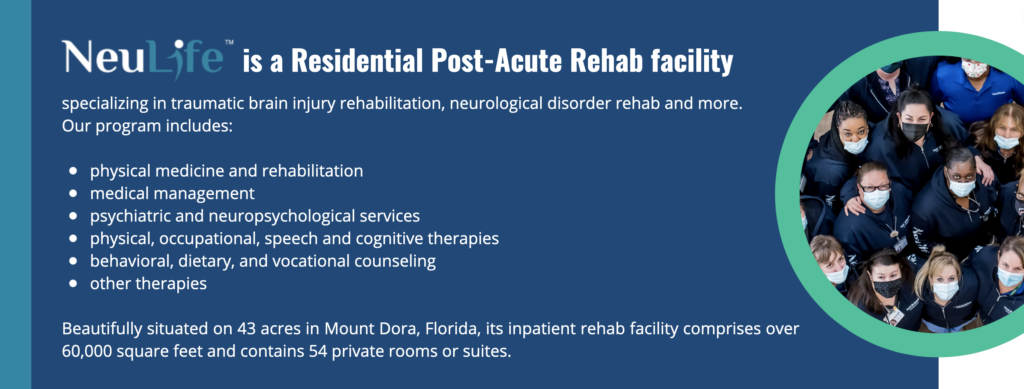
These are some symptoms of early depression. Usually the symptoms last at least a week or more and interfere with everyday life:
Often, people suffering from depression do not notice their symptoms, leaving it up to caregivers and close friends or family to be attentive to mood or behavioral changes.
Remember some amount of sadness after a brain injury is normal. But when it lasts for a prolonged period of time and the symptoms do not seem to improve, then it may be depression. Fortunately, post-acute rehabilitation offers effective treatment options specializing in TBI and depression.
Depression is usually treated two ways:
The most important component in treating depression at a neuro-rehabilitation centre is having the support of loved ones. If the patient is experiencing depression, they may feel lonely, worthless, or like they do not belong.
If those close to the patient make an effort to show love and compassion, it can aid in healing. A simple way to accomplish this is by opening up lines of communication and including them in social activities when they occur.
There are a few factors that may contribute to depression if your loved one has had a TBI. For one, they may have experienced actual physical changes in the brain due to the injury. Sometimes there is damage to the part of the brain that is in charge of regulating emotions.
There are also lifestyle changes that a TBI impacts. The patient may experience job loss, disability, or loss of income. Any of these factors can contribute to depression.
Also, specific individuals may be more at risk of suffering from depression. There may be a hereditary component, personal history, substance abuse, or another risk factor involved. If these factors are present before the injury, the patient is more at risk for depression.
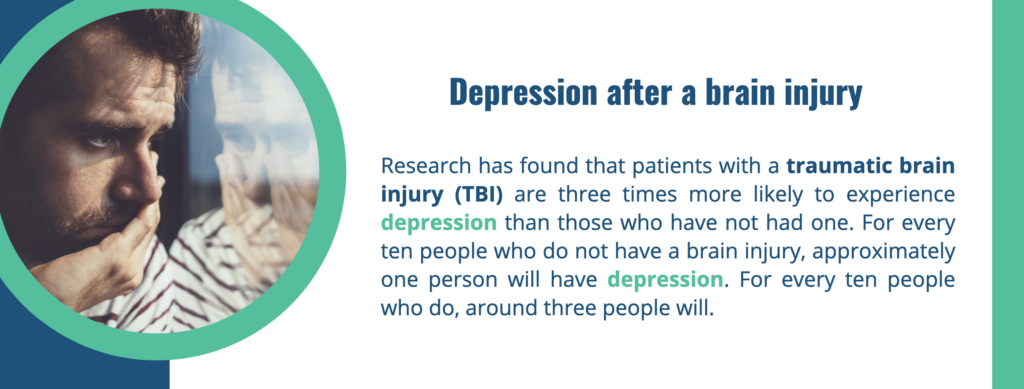
NeuLife is a Residential Post-Acute Rehab facility specializing in traumatic brain injury rehabilitation, neurological disorder rehab and more. Its program includes physical medicine and rehabilitation, medical management, psychiatric and neuropsychological services, physical, occupational, speech and cognitive therapies, behavioral, dietary, and vocational counseling, and more.
Beautifully situated on 43 acres in Mount Dora, Florida, its inpatient rehab facility comprises over 60,000 square feet and contains 54 private rooms or suites.
For more information about NeuLife Rehabilitation Services, please give us a call at 800.626.3876, or visit our website. You can also make a referral or schedule a tour!
The material contained on this site is for informational purposes only and DOES NOT CONSTITUTE THE PROVIDING OF MEDICAL ADVICE, and is not intended to be a substitute for independent professional medical judgment, advice, diagnosis, or treatment. Always seek the advice of your physician or other qualified healthcare providers with any questions or concerns you may have regarding your health.
Residential treatment of people with complex conditions or post-injury issues is often more successful than outpatient care. Being in a program 24 hours a day, 7 days a week, may seem daunting, but this environment also provides continuous support.
It is one of the main reasons why people who go through residential rehab in Florida have a better chance of getting to long-term recovery and staying healthy. There are many benefits of residential rehabilitation, for which we will cover in this article.
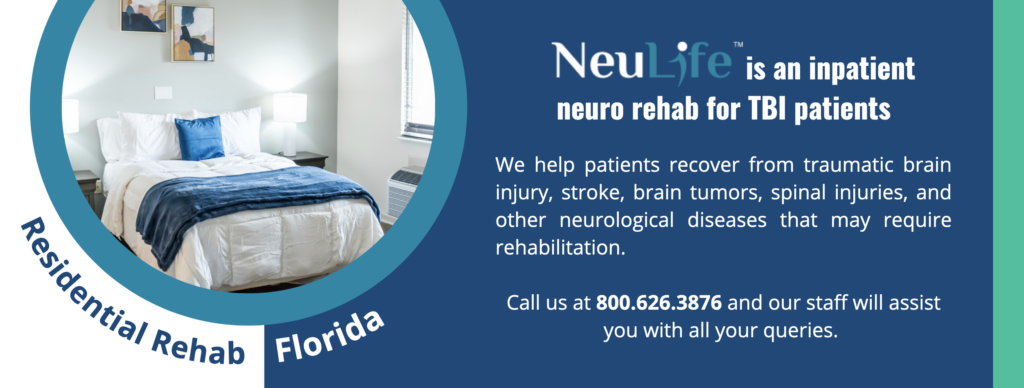
A regular, daily schedule may seem very restrictive at first sight. However, the structure and routine allow each person to focus on getting healthy instead of managing their time. It eliminates gaps of downtime and gives stability to the rougher moments of recovery. A planned schedule that involves recreational activities helps people re-develop their willpower and learn to keep commitments.
Residents can make use of the many site amenities. These include:
We can offer such amenities on our campus because we are the largest residential rehab in Florida. Our staff provides a delicate balance between activities and therapies that allows for rest and entertainment between intensive rehabilitation sessions.
Many people who have had severe injuries or have complex neurological conditions feel isolated, insecure, and misunderstood. They may also experience the guilt of putting a heavy burden on the shoulders of their nearest and dearest.
Therapies help address not only patients’ physical requirements, but also their emotional and spiritual needs. Our neuro rehab center offers the least restrictive environment possible, so patients retain both a sense of privacy and freedom. You can trust your loved one is being cared for, lessening the burden while all adjust to the diagnosis.
At NeuLife Rehab, everyone you meet during the day will understand the pain and suffering your condition causes. There is no need to justify or explain yourself. Fellow patients often share their own stories of struggle and success, and our professional staff serves as knowledgeable and compassionate guides. Whenever you’re at a challenging moment, someone will be there to help you through it.
Freed from work, school, friends, and family obligations, a person at a residential rehab facility can entirely focus on themselves. Residential treatments aim to achieve more than physical health. People address their past issues and develop new healthy habits and focus on their psychological well-being.
People with complicated conditions can start loving themselves again and creating higher self-esteem. The structure and the community provide an environment where patients have the opportunity to heal their body, mind, and spirit.
The ultimate goal of any residential rehab program is a successful and sustainable recovery. Consider residential rehab if you have not had success with outpatient treatment, have a poor support structure at home, or need structure, community, and focus on solving your issues.
There are several reasons behind the need for post-acute rehabilitation. The care plans are specially designed based on the diagnosis as well as every individual’s needs. The team structures therapies and medical care based on what may ensure the best outcome for the patient at our neurorehabilitation center.
Our clinical experts see patients who have suffered from:
All programs are designed so the patients can accomplish their goals in life and, over time, can make a healthy transition back into their community.
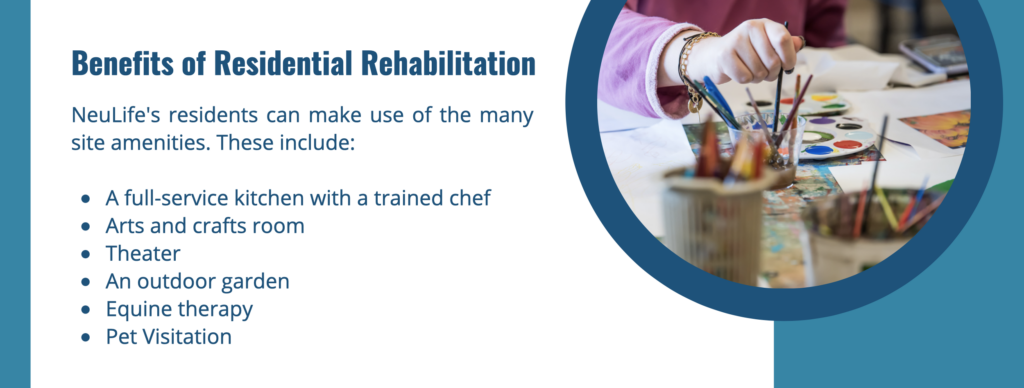
NeuLife is an inpatient neuro rehab for TBI patients in Florida. We help patients recover from traumatic brain injury, stroke, brain tumors, spinal injuries, and other neurological diseases that may require rehabilitation.
Our facility successfully helps patients through structured programming, including speech, physical therapy, medical care, skills development, nutrition and exercise, and mental health therapies, including CBT.
Call us or schedule a tour, and our staff will assist you with all your queries. We want to make your return to everyday life comfortable and quick. You can also make a referral.
The material contained on this site is for informational purposes only and DOES NOT CONSTITUTE THE PROVIDING OF MEDICAL ADVICE, and is not intended to be a substitute for independent professional medical judgment, advice, diagnosis, or treatment. Always seek the advice of your physician or other qualified healthcare provider with any questions or concerns you may have regarding your health.
Brain damage or injury is a condition wherein the brain cells are destroyed or deteriorating. Brain injury is one of the main contributors to the huge number of disabilities and deaths in the United States every year. Brain damage happens as a result of a traumatic brain injury or acquired brain injury (non-traumatic). Depending on the severity, some patients take years to fully recover from it. In order to recover well from brain trauma, patients have to undergo different kinds of therapy from the best brain injury rehabilitation centers.
Brain injury occurs when there is damage to the brain that causes temporary or permanent cognitive, psychosocial, or physical impairment. It has two general types: traumatic and non-traumatic.
Data from the Centers for Disease Control and Prevention (CDC) shows that there were 2.87 million incidents of traumatic brain injury in 2014. A staggering 837,000 of these cases happened in children. These numbers continue to climb every year.
On the other hand, stroke, which is one of the most common non-traumatic injuries, affects 7.8 million people. This is 3.1% of the country’s adult population
A heart attack, also known as myocardial infarction, happens when a part of the heart is not receiving enough blood flow. The longer the heart is deprived of blood and oxygen, the greater the damage to the myocardium (heart muscle). Once damaged, the heart will be inefficient in pumping out blood.
One American suffers a heart attack every 40 seconds, according to the CDC. In fact, there are approximately 805,000 cases of heart attacks in the United States every year.
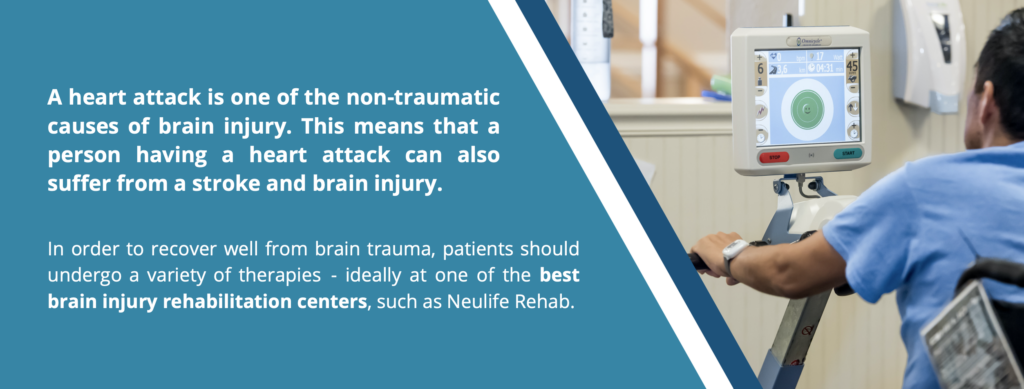
A heart attack is one of the non-traumatic causes of brain injury. This means that a person having a heart attack can also suffer from a stroke and brain injury.
According to Harvard Health, the risk factors for strokes and heart attacks are almost identical. These include obesity, high blood pressure, high cholesterol levels, cigarette smoking, diabetes, and a sedentary lifestyle.
As mentioned previously, a heart attack happens when there is a blockage in an artery that supplies blood to the myocardium. Because of this, the blood flow to the heart is cut off, resulting in tissue damage, tissue death, and altered electrical conduction. When these happen, the heart will no longer be efficient in pumping blood throughout the body.
Poor blood supply is the formula for tissue damage. This includes kidney damage and brain damage. Likewise, without the pumping movement of the heart, the blood in the blood vessels would no longer flow and will start to stagnate. In people with high cholesterol levels and diabetes, this can make the blood viscous, leading to the formation of blood clots. When these clots form, they block the artery that supplies blood to the brain tissues, which can result in an ischemic stroke.
Doctors measure the stroke risk of a heart attack patient using the CHADS-VASc assessment. If the patient belongs in risk categories 1 and 2, the patient will be given appropriate pharmacologic therapies to prevent a stroke.
To better understand the relationship between heart attacks and brain damage, let’s discuss the role of oxygen. Your brain needs an adequate oxygen sypply in order to function normally. Studies have shown that brain cells die when levels of oxygen in the brain significantly drops even just for several minutes. If the brain is deprived of oxygen longer than a few minutes, brain damage can occur. This injury is referred to cerebral hypoxia or anoxic brain injury.
As mentioned above, blood flow to and from the heart is cut off during a heart attack. Blood carries oxygen to the organs including the brain. So, during a heart attack, oxygen supply to the brain is also cut off. This is why around half of people who survive a heart attack often develop cognitive issues such as:
Heart attacks are very common. While there are ways to keep yourself healthy and reduce your risk for heart problems that may lead to a heart attack, there’s no guarantee that you won’t suffer from one. Patients who are unfortunate to experience a heart attack, but fortunate to survive it, can fully recover from the associated cognitive issues through timely and proper post acute brain injury rehabilitation, such as what we offer here at NeuLife Rehab.
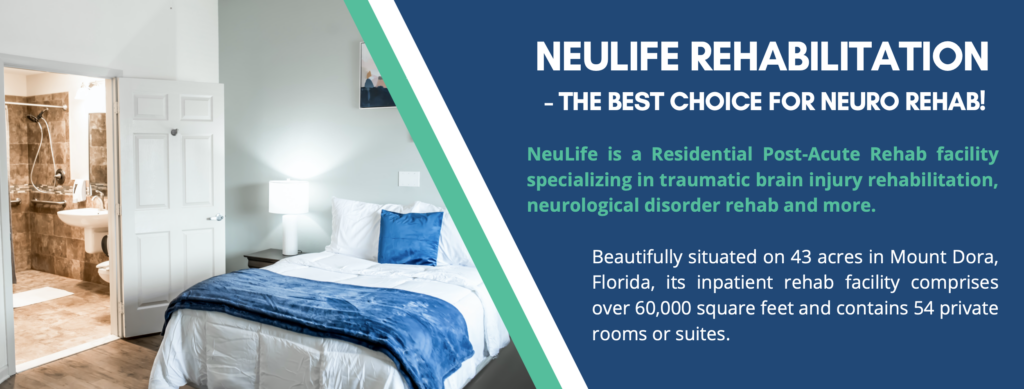
NeuLife is a Residential Post-Acute Rehab facility specializing in traumatic brain injury rehabilitation, neurological disorder rehab and more. As one of the best brain injury rehabilitation centers in Florida, its program includes physical medicine and rehabilitation medical management, psychiatric and neuropsychological services, physical, occupational, speech, and cognitive therapies, behavioral, dietary and vocational counseling, and more.
Beautifully situated on 43 acres in Mount Dora, Florida, its inpatient rehab facility comprises over 60,000 square feet and contains 54 private rooms or suites.
For more information about NeuLife Rehabilitation Services, please give us a call at 800.626.3876, or visit our website. You can also make a referral or schedule a tour!
The material contained on this site is for informational purposes only and DOES NOT CONSTITUTE THE PROVIDING OF MEDICAL ADVICE, and is not intended to be a substitute for independent professional medical judgment, advice, diagnosis, or treatment. Always seek the advice of your physician or other qualified healthcare providers with any questions or concerns you may have regarding your health.
A stroke is a serious matter and can happen to anyone at any time. One stroke occurs every 40 seconds in the United States. According to the Center for Disease Control and Prevention (CDC), strokes are the fifth leading cause of death in the United States. The good news is strokes are preventable and treatable with post-acute rehabilitation.
The best brain injury rehabilitation centers offer a comprehensive program specifically tailored to stroke patients. Post-acute refers to a program that patients attend after initial treatment, usually at a hospital or dedicated facility. Patients will have access to medical doctors, physical therapists, psychologists, occupational therapists, dieticians, nursing staff, and case managers to work on their specific needs.
Of course, the goal is to prevent a stroke initially. There are several causes of stroke you should be aware of so steps can be taken toward prevention.
If you have already had a stroke or transient ischemic attack (TIA), you are more likely to have another event. TIAs are mini-strokes that are more common in the elderly population. High blood pressure is also a risk factor for stroke. It is, in fact, the leading cause of stroke (2020). It is vital to have your blood pressure checked regularly and start a medication or lifestyle modification program under the care of a physician.
Certain diseases increase the likelihood of stroke. Heart disorders such as coronary artery disease and atrial fibrillation are significant risk factors. Both are treatable under physician care.
Diabetes increases the risk of stroke. Diabetes contributes to a lack of oxygen to the brain, while also being a risk factor of high blood pressure.
Other diseases, such as sickle cell anemia, can cause a stroke. Due to the abnormal formation of blood cells as a result of the disease, the “sickled” red cells can get caught in blood vessels, blocking flow to the brain, causing a stroke.
Importantly, smoking and obesity are significant contributors to stroke. If lifestyle modifications are necessary to quit smoking or lose weight, a physician can help design a program or prescribe helpful medication, so you succeed.
Signs of a stroke can present similarly in men and women. Numbness or weakness in the face or a body part such as an arm or leg is one sign of a stroke. These symptoms may occur throughout one side of the body. Someone experiencing a stroke may have confusion, trouble speaking, or difficulty understanding speech.
Sudden trouble seeing out of one or both eyes may be an indicator of stroke. The person may also have difficulty walking, dizziness, a loss of balance, or lack of coordination.
It is important to note that someone having a stroke may have one or all of these symptoms. Some people have a stroke without showing any signs at all.
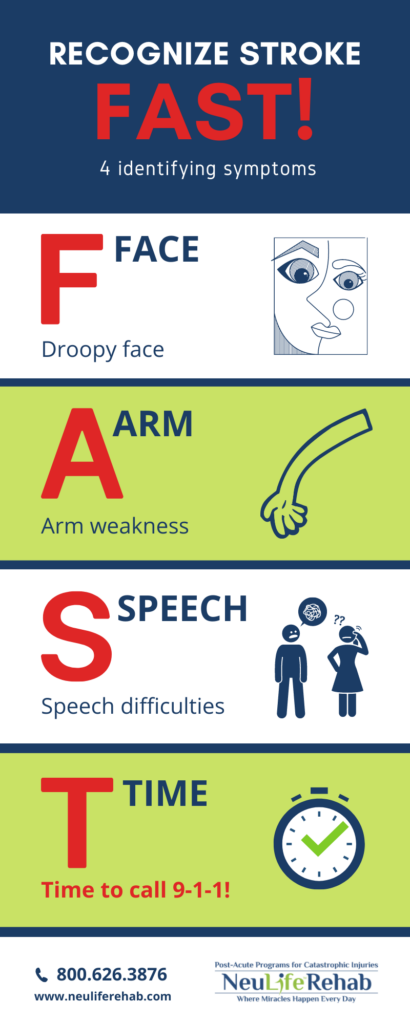
If your loved one has a stroke and is hospitalized, finding the best brain injury rehabilitation center nearby is essential.
NeuLife is an inpatient post-acute rehabilitation center located in Florida. Their facility and multi-disciplinary staff combine to offer the best environment for stroke rehab. NeuLife offers several unique amenities, including trained chefs, arts and crafts, a theatre, outdoor gardens, a game area, and on-site equine therapy. You can be assured if rehabilitation is necessary, you are receiving state of the art treatment in a healing environment. It is what you or your loved one deserves so you may reclaim your life. If you would like more information about our services, give us a call at 800.626.3876 or to make a referral, just click here.
References: National Center for Chronic Disease Prevention and Health Promotion (2020, April 7).: Stroke
The material contained on this site is for informational purposes only and DOES NOT CONSTITUTE THE PROVIDING OF MEDICAL ADVICE, and is not intended to be a substitute for independent professional medical judgment, advice, diagnosis, or treatment. Always seek the advice of your physician or other qualified healthcare providers with any questions or concerns you may have regarding your health.
A concussion is a form of mild traumatic brain injury that typically occurs when a person suffers a direct hit to the head or a whiplash injury. This leads to coup and countercoup movement, where the outside force causes the brain to accelerate against the skull before decelerating and hitting the back of the skull.
These movements can lead to bruising and swelling of brain tissues. Damage to blood vessels and nerves may also happen.
To find out more about TBI check out our article: TRAUMATIC BRAIN INJURY (TBI): ARE YOU AT RISK?
Data from the Brain Injury Research Institute has shown that every year, approximately 10% of athletes who engage in contact sports sustain concussion injuries. Furthermore, 1.5 million people in the U.S. suffer from traumatic brain injuries, with at least 1 TBI case occurring every 15 seconds.
In some cases, the MRI or CT scan doesn’t show any abnormalities; however, the patient may experience various symptoms that indicate the concussion. Furthermore, the symptoms often don’t show up for hours or even days after the accident took place.
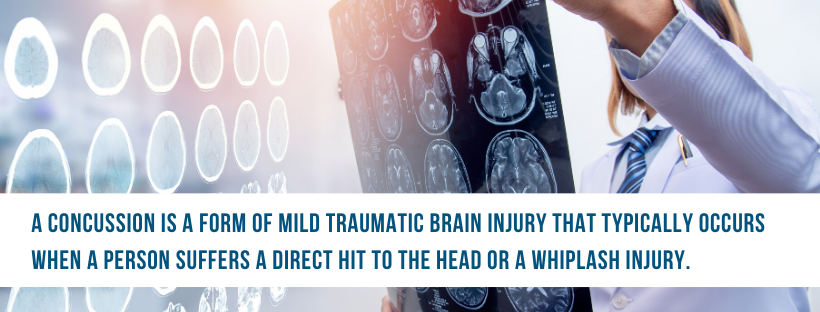
According to the Brain Injury Association of America, the symptoms may include, but are not limited to:
Many patients often fail to report the injury and the concussion remains undetected. Unfortunately, when the concussion is left untreated, it may take much longer to recover from it.
Although the severity of brain damage that patients sustain from concussions is mild, the consequences to health and wellbeing may not be. Without timely treatment, recovery might be slower. Therefore, if you have suffered any blow to the head, experts at Neulife Rehab and Brain Injury Center strongly recommend that you seek medical consultation.
This is extremely important as only medical experts can determine the full extent of the injury and the best course of treatment. Worse cases usually warrant a visit to a reputable post-acute rehab facility to help patients return to their pre-injury state in the soonest and safest possible time.
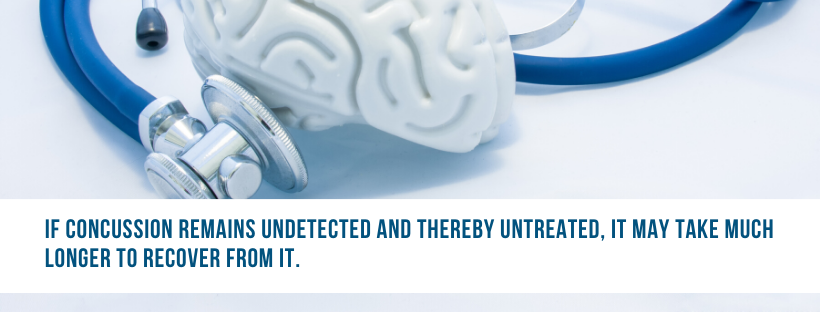
When you are on the road to full recovery, do not overexert yourself. Experts warn against returning to your normal physical activity until you are given the go-ahead by your doctor. If you sustain a second concussion without fully recovering from the first one, then this can have very serious health consequences.
At Neulife Rehab our team of qualified professionals helps our patients return to their pre-injury state through physical therapy, occupational therapy, and many other scientifically-proven rehabilitation practices. At first, you might find it harder to process information. However, this stage is temporary and you will see improvements as you continue with the rehabilitation.
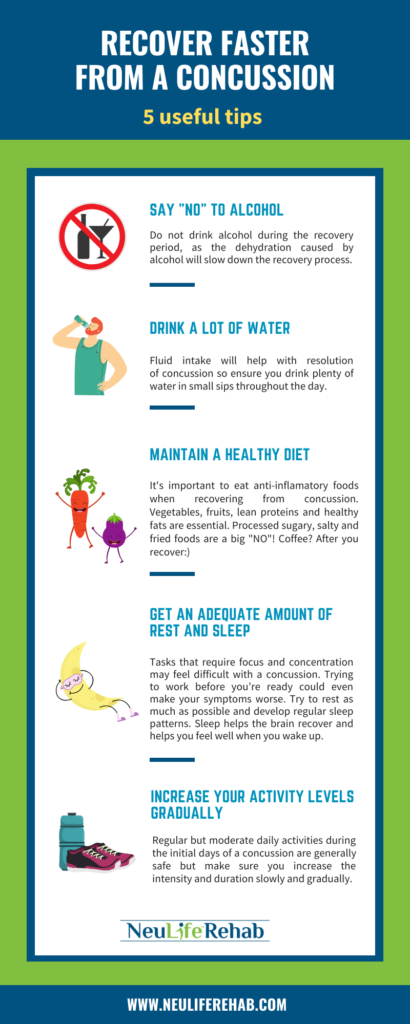
NeuLife Rehabilitation is one of the largest residential post-acute rehab programs specializing in rehabilitation for a wide range of catastrophic injuries. We are accredited by the Commission on Accreditation of Rehabilitation Facilities (CARF) in Brain Injury Specialty Programs and Residential Rehabilitation.
Our professional staff make sure that you and your family are being taken care of by the best specialists in the area. We encourage you to find out more about our facility and our programs. If you have any questions at all, we are here for you. Call us or make a referral using our easy to navigate and convenient online form. We are looking forward to helping you achieve your recovery goals.
The material contained on this site is for informational purposes only and DOES NOT CONSTITUTE THE PROVIDING OF MEDICAL ADVICE, and is not intended to be a substitute for independent professional medical judgment, advice, diagnosis, or treatment. Always seek the advice of your physician or other qualified healthcare providers with any questions or concerns you may have regarding your health
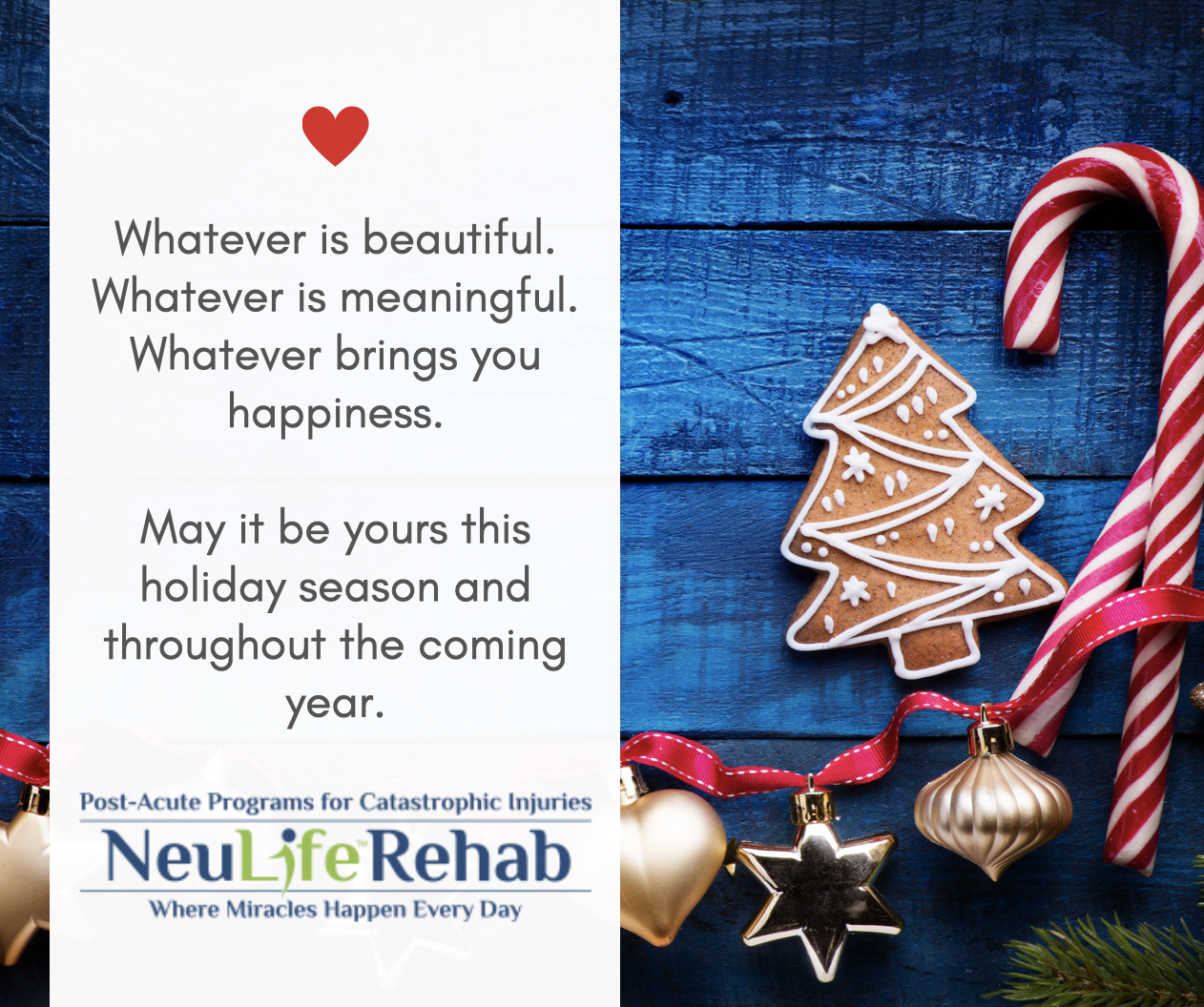

We know that choosing the next step in your recovery from a catastrophic illness or injury is complex. Together, we can help you take the next step.
Contact us with any questions today.